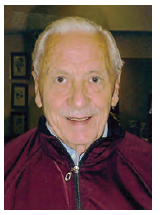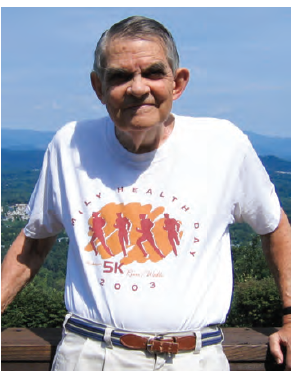By James Zug
It is not what you accomplish. It is what you overcome.
 Charles Mallet-Prevost Brinton died in June 2011 at the age of ninety one. The last remaining national singles champion from the 1940s, he was a brilliant player who overcame epilepsy to win four national singles and two national doubles titles.
Charles Mallet-Prevost Brinton died in June 2011 at the age of ninety one. The last remaining national singles champion from the 1940s, he was a brilliant player who overcame epilepsy to win four national singles and two national doubles titles.
Charley—as he always spelled his first name—was called Pee-Wee at Episcopal Academy because he was the smallest boy in his class. He played No. 1 on the squash and tennis teams all four years of high school and was captain of the squash team for his final three seasons. His greatest win as a schoolboy was in the 1935 Episcopal championship, when he survived match points in the fourth game of the finals and then came back from a 10-3 deficit in the fifth game to win 15-12 over Al Freund.
He was in the class of 1941 at Princeton but didn’t graduate until 1942 because he had to take a year off to deal with his epilepsy. He had an attack at the 1942 nationals in Buffalo. On the Sunday afternoon he left Shorty Knox’s home after lunch to go play his match in the finals. Ten minutes later Knox went outside to leave as well and found Brinton passed out in a snow drift. Brinton went on to beat Harold Kaese in five games.
He won two straight national intercollegiate titles the same two years he won the nationals. Then the Second World War intervened. There are all kinds of what ifs in sports— perhaps the most well-known is what if Ted Williams had not missed more than four seasons because of war—but Brinton was the dominant player in the forties. He won the nationals the first two times after the war. Twice during the war he played in exhibitions benefiting the Red Cross at the University Club of New York. The matches were against Lester Cummings, the professional champion. Brinton beat Cummings one year and lost the next. If you grant, say, two of the three missing nationals to Brinton, he would have had six. He won the national doubles with Don Strachan and then with his old Princeton classmate Stan Pearson, Jr. He continued to win tournaments into the fifties. At the 1951 nationals he lost in the semis to Henri Salaun 15-12 in the fifth and at the 1953 nationals he lost in the quarters 18-17 in the fifth to Diehl Mateer.
“Charley was the ideal champion,” wrote Jack Barnaby. “Many of his drives were masterpieces, played with pistol shot crispness and so accurate they would glue to the wall after bouncing.” A member of the intercollegiate and Episcopal halls of fame, in 2000 Charley was elected to the U.S. Squash Hall of Fame in its inaugural year. He very well might have been the greatest American ever to play the game.
He was also one of the funniest men on the squash circuit. His bushy eyebrows would arch with mirth throughout the weekends. His favorite photograph was from Montreal when he disguised himself as a freight-riding hobo at the Canadian nationals. I spent an afternoon with him two years ago, at his apartment in Charlottesville, and he was much more interested in retellings stories from squash weekends and memories of old comrades then recalling victories. There are no statistics on friendships, but squash has surely just lost one of the greatest friends of the game.
George Wadsworth died in June 2011. He was ninety years-old.
 His father, George Wadsworth II, was a U.S. ambassador in the Middle East and Europe. George was born in Istanbul and grew up in Washington, Cairo, Tehran, Bucharest, Jerusalem and Beirut. He went to high school at Nicols in Buffalo and was the class of 1943 at Princeton. He joined the Marines and fought at Iwo Jima during the Second World War. After the war he moved to Mexico to help run General Electric’s branch there. In 1955 he left GE and set up his own light bulb company. In 1971 he bought a house in Mexico City with a squash court and began playing the game. In the 1990s he was ranked in the top three in the 70+ hardball singles.
His father, George Wadsworth II, was a U.S. ambassador in the Middle East and Europe. George was born in Istanbul and grew up in Washington, Cairo, Tehran, Bucharest, Jerusalem and Beirut. He went to high school at Nicols in Buffalo and was the class of 1943 at Princeton. He joined the Marines and fought at Iwo Jima during the Second World War. After the war he moved to Mexico to help run General Electric’s branch there. In 1955 he left GE and set up his own light bulb company. In 1971 he bought a house in Mexico City with a squash court and began playing the game. In the 1990s he was ranked in the top three in the 70+ hardball singles.
In 1990 he founded the Copa Wadsworth, the annual U.S. v. Mexico squash match which has greatly helped cement bonds between the two nations. The trophy is a silver cup that his father won in the 1930s for winning the national golf championship of Egypt.


